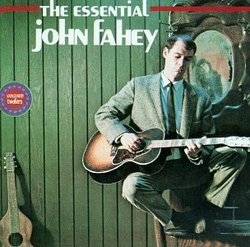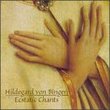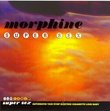| All Artists: John Fahey Title: The Essential John Fahey Members Wishing: 8 Total Copies: 0 Label: Vanguard Records Original Release Date: 1/1/1993 Re-Release Date: 3/20/1993 Genres: Country, Blues, Folk, Pop Styles: Traditional Blues, Traditional Folk, Contemporary Folk Number of Discs: 1 SwapaCD Credits: 1 UPCs: 015707555623, 090204505425, 4007198833690 |
Search - John Fahey :: The Essential John Fahey
 | John Fahey The Essential John Fahey Genres: Country, Blues, Folk, Pop
|
Larger Image |
CD DetailsSimilar CDs
|
CD ReviewsYes, indeed, essential is the word P. Bryant | Nottingham, England | 07/03/2000 (5 out of 5 stars) "By 1967 Fahey was at the height of his compositional and playing power, and pieces like "The Yellow Princess" and "When the Catfish is in Bloom" are truly stunning. Even the less flamboyant - say, "Charles A Lee" - have a mesmerising beauty. There is not one wasted second on this brilliant cd (which consists of 2 albums "Yellow Princess" and "Requia" minus a long guitar-plus-sound-effects piece called "Requiem for Molly" which you're better off without). Listen to the ringing intro to "The Yellow Princess", or its helterskelter finale; melt away to the simple tune which wraps up "Russell Blaine Cooper"; delight in the whole thing. Guitar perfection." This album documents the creation of a genre of music P. Bryant | 04/26/1999 (5 out of 5 stars) "In the late 1950's, 6-string acoustic guitar was the instrument of hillbillies, folk, and bluegrass players who used it as a tuned, chordal drum to accompany vocal tunes. John Fahey appeared and began to compose and perform elaborate, eclectic instrumentals on the guitar, pioneering a style that merged styles as disparate as Bartok, Indian raga, John Cage, and the delta blues of Skip James and Bukka White. This album documents the creation of a genre that Fahey called American Primitive Guitar and paved the way for future innovators such as Leo Kottke, Michael Hedges, Preston Reed, Pierre Bensusan, and others. Fahey's hypnotic, droning, angular music is unique among the annals of guitar. The Essential John Fahey catalogs his more known early work on Fahey's now defunct Takoma label. Many guitarists wore out the grooves in John's vinyl albums trying to cop licks and figure out his varied open tunings. It's a must-listen for every student of the acoustic guitar. Fahey will someday be esteemed as highly as Segovia is in the world of classical guitar." Mesmerizing Sounds From A Steel String Guitar prisrob | New EnglandUSA | 02/19/2007 (5 out of 5 stars) ""This album documents the creation of a genre that Fahey called American Primitive Guitar and paved the way for future innovators such as Leo Kottke, Michael Hedges, Preston Reed, Pierre Bensusan, and others. Fahey's hypnotic, droning, angular music is unique among the annals of guitar. The Essential John Fahey catalogs his more known early work on Fahey's now defunct Takoma label. Many guitarists wore out the grooves in John's vinyl albums trying to cop licks and figure out his varied open tunings. It's a must-listen for every student of the acoustic guitar. Fahey will someday be esteemed as highly as Segovia is in the world of classical guitar." unknown author
John Fahey seems a folk hero in the age of acoustic guitar. He is much beloved by the likes of Leo Kottke, John Cage, Skip James and Bukka White. His album documents the creation of music in the late 1950's, a 6-string acoustic guitar. "This was the instrument of hillbillies, folk, and bluegrass players who used it as a tuned, chordal drum to accompany vocal tunes." say the experts. John Fahey began to compose and perform eclectic instrumentals on the guitar. He helped to pioneer styles of classical, Indian raga and delta blues. On this CD 'Yellow princess' and 'Requia are the most memorable. This is John Fahey at his best, playing singly on his acoustic guitar; "Singin bridge of Memphis" and "Dance of the inhabitants of Bladensberg. John Fahey created some of his best music in the last years of his life. Although John Fahey passed away six years ago, his name has resurfaced because of "freak-folkers," namely Sufjan Stevens, Devendra Banhart and M. Ward. They have all been influenced by John Fahey's taste of folk, blues, classical, Brazilian and Indian. "In 2000, the American record label Drag City published a volume of Fahey's esoteric short stories, How Bluegrass Music Destroyed My Life, edited by Damian Rogers with an introduction by O'Rourke. In February 2001, just a few days before what would have been his 62nd birthday, John Fahey died at Salem Hospital after undergoing a sextuple bypass operation. And, in 2006, five years after his death, no less than four John Fahey tribute albums were released as a testament to his reputation as a 'giant of 20th century American music'" Wikipedia An extraordinary experience listening to this CD of John Fahey's. My best friend and I were quite conscious of being in the presence of greatness on an acoustic guitar. Soothing and hypnotic at times, with closed eyes I was transported to places of wondrous dreams. Highly, Highly Recommended. prisrob 2-18-07 " |

 Track Listings (13) - Disc #1
Track Listings (13) - Disc #1


